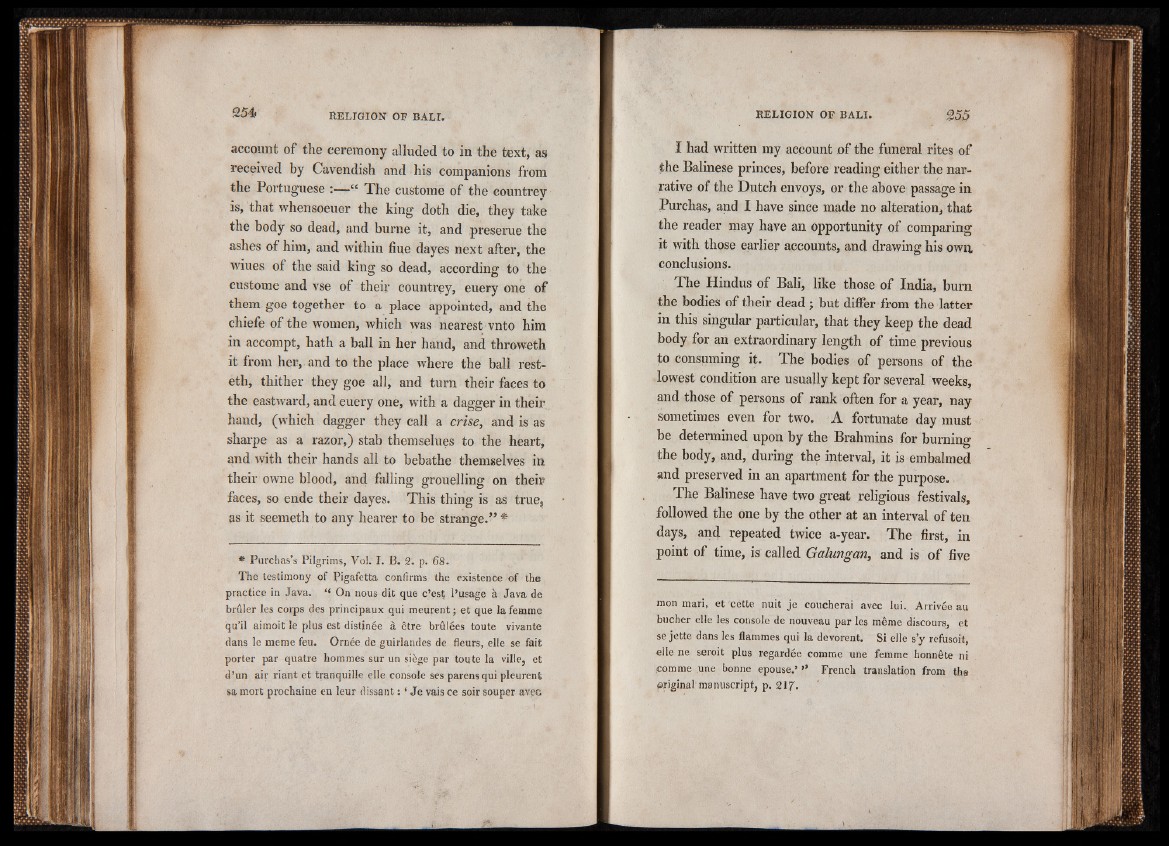
account of the ceremony alluded to in the text, as
received by Cavendish and his companions from
the Portuguese :—“ The custome of the countrey
is, that whensoeuer the king doth die, they take
the body so dead, and burne it, and preserue the
ashes of him, and within flue dayes next after, the
wiues of the said king so dead, according to the
custome and vse of their countrey, euery one of
them goe together to a place appointed, and the
chiefe of the women, which was nearest vnto him
in accompt, hath a ball in her hand, and throweth
it from her, and to the place where the ball rest-
eth, thither they goe all, and turn their faces to
the eastward, and euery one, with a dagger in their
hand, (which dagger they call a crise, and is as
sharpe as a razor,) stab themselues to the heart,
and with their hands all to bebathe themselves in
their owne blood, and falling grouelling on their
faces, so ende their dayes. This thing is as true,
as it seemeth to any hearer to be strange.” *
* Purchas’s Pilgrims, Vol. I. B. 2. p. 68.
The testimony of Pigafetta confirms the existence of the
practice in Java. “ On nous dit que c’est l’usage à Java de
brûler les corps des principaux qui meurent; et que la femme
qu’il aimoit le plus est distjnée à être brûlées toute vivante
dans le meme feu. Ornée de guirlandes de fleurs, elle se fait
porter par quatre hommes sur un siège par toute la ville, et
d’un air riant et tranquille elle console ses parensqui pleurent
sa mort prochaine en leur dissant : ‘ Je vais ce soir souper avec
I had written my account of the funeral rites of
the Balinese princes, before reading either the narrative
of the Dutch envoys, or the above passage in
Purchas, and I have since made no alteration, that
the reader may have an opportunity of comparing
it with those earlier accounts, and drawing his own
conclusions.
The Hindus of Bali, like those of India, burn
the bodies of their dead; but differ from the latter
in this singular particular, that they keep the dead
body for an extraordinary length of time previous
to consuming it. The bodies of persons of the
lowest condition are usually kept for several weeks,
and those of persons of rank often for a year, nay
sometimes even for tyro. A fortunate day must
be determined upon by the Brahmins for burning
the body, and, during the interval, it is embalmed
and preserved in an apartment for the purpose.
The Balinese have two great religious festivals,
followed the one by the other at an interval of ten
days, apd repeated twice a-year. The first, in
point of time, is called Galungan, and is of five
mon mari, et cette nuit je coucherai avec lui. Arrivée au
bûcher elle les console de nouveau par les même discours, et
se jette dans les flammes qui la devorent. Si elle s’y refusoit,
elle ne seroit plus regardée comme une femme honnête ni
.comme une bonne epouse.’ ” French translation from the
original ma nuscript, p. 217.